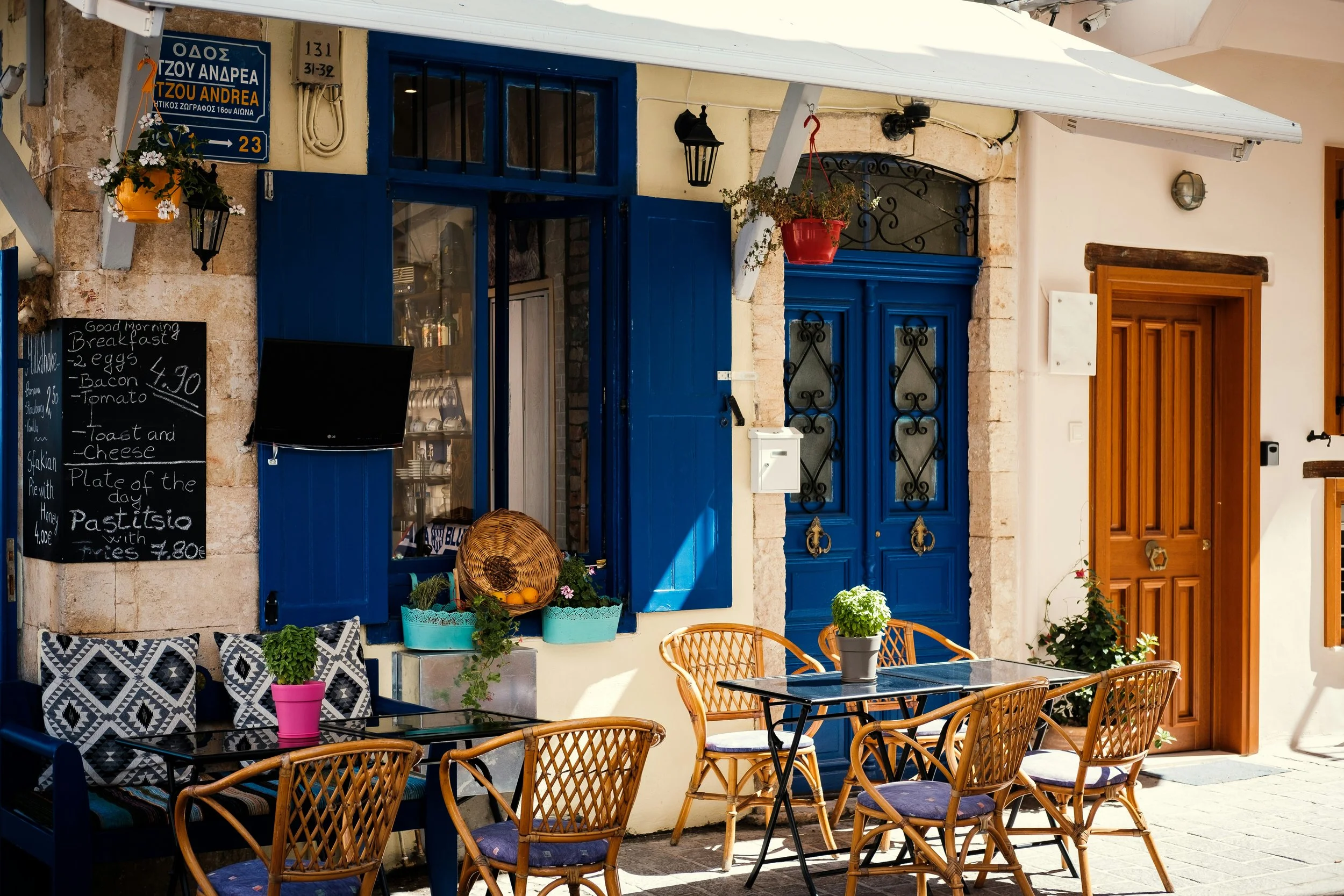Greece for Digital Nomads: The Coolest Places to Go
Greece might be best known for whitewashed villages and ancient ruins, but it’s quietly becoming one of the most compelling places in Europe for digital nomads. Whether you’re chasing blue skies, island views, or a deep sense of history, Greece delivers—all while staying surprisingly affordable for a European destination. The lifestyle here is laid-back but soulful. You’ve got cafés where people linger for hours, co-working spaces tucked into historic neighborhoods, and a pace of life that encourages more balance than burnout.
What makes Greece especially great for remote work is the range. You can set up shop in fast-paced Athens, retreat to the hills of a sleepy island, or bounce between ferry rides and deadlines. There’s strong WiFi in most urban centers, a growing digital nomad visa program, and one of the healthiest food cultures on earth. Whether you want to go full hermit mode or plug into a community of creative expats, here are the best places to live and work in Greece as a digital nomad.
Can’T wait to explore Greece?
Explore the best flight deals to Greece here
Athens – The Creative Capital
Athens is a city where ancient history and modern hustle collide in the best possible way. Beneath the Acropolis, you’ll find a city that’s gritty, vibrant, and full of unexpected charm. For digital nomads, Athens offers the perfect mix of culture, affordability, and energy. You can spend your mornings working from a rooftop café with views of ancient ruins, and your evenings hopping between wine bars, galleries, and live shows. The neighborhood of Exarchia has long been a haven for artists and activists, while places like Koukaki and Pangrati are packed with freelancers tapping away on laptops between frappés.
The infrastructure for remote work is solid: WiFi is fast and stable, and coworking spots like The Cube Athens, Impact Hub, and Spaces give you great options for productivity and community. The city is walkable (though chaotic), the metro is cheap and easy to navigate, and the food scene is outrageously good—from €2 souvlaki to trendy vegan mezze spots. Downsides? Summer heat is no joke, and the city can feel intense if you’re not used to urban sprawl. But if you’re looking for a place that’s raw, inspiring, and alive with creative momentum, Athens is it.
Thessaloniki – The Chill City with Big Energy
If Athens feels like a loud, fast-talking friend, Thessaloniki is its cooler, more relaxed sibling. Greece’s second-largest city is famous for its café culture, student energy, and creative undercurrent—and it’s quickly becoming a favorite among remote workers who want something more low-key without sacrificing the perks of city life. You’ll find laptop-friendly cafés everywhere, especially along the seaside promenade, where you can work with a view of the Aegean and take your lunch break with a walk to the White Tower.
The cost of living in Thessaloniki is noticeably cheaper than in Athens, and the vibe is way more relaxed. There's a youthful, artsy crowd thanks to the city’s universities, and neighborhoods like Ano Poli (the old town) offer stunning views and a slower pace. While the coworking scene isn’t as established as in the capital, there are still solid options like Coho and i4G Pro, and many nomads just opt for cozy cafés with strong WiFi. If you want a balance of culture, sea breezes, and a strong sense of community—without the big-city chaos—Thessaloniki is a seriously underrated gem.
Chania (Crete) – The Island Life with Infrastructure
Chania is one of those places that makes you wonder why more people aren’t working remotely from Greek islands. Located on the northwest coast of Crete, it strikes an almost perfect balance between natural beauty, historic charm, and modern convenience. Picture this: your office is a converted stone building in the Old Town, lunch is a €6 plate of local dakos by the harbor, and you wrap up your day with a swim in the turquoise sea. Sounds like a fantasy, but in Chania, it’s just Tuesday.
Unlike smaller islands, Crete has real infrastructure. You’ll find strong WiFi, proper supermarkets, and coworking spaces like Workhub Chania that cater to the growing remote work crowd. The expat and digital nomad community here is small but active, and locals are famously warm. Off-season, the town gets quiet (some would say magical), while summer brings a livelier buzz without the chaos of more touristy islands. If you want laid-back island life but still need to get work done, Chania delivers in a big way.
Syros – The Hidden Gem for Peaceful Productivity
Syros doesn’t shout for attention, and that’s exactly what makes it special. Tucked into the Cyclades but without the crowds of Santorini or Mykonos, it offers a much more local, grounded experience. The capital, Ermoupoli, is a neoclassical stunner—think marble-paved squares, pastel mansions, and winding alleys lined with bakeries and bookshops. It’s the kind of place where you can slow down, get focused, and still feel like you’re living in a postcard.
This is a dream spot for solo creatives or anyone craving a slower, more intentional pace. There aren’t many coworking spaces here, but the WiFi is surprisingly reliable and cafés are laptop-friendly. It’s especially great for writing, coding, or deep work—Syros won’t distract you with constant stimulation, but it will reward you with quiet walks, golden-hour swims, and a rare sense of calm. If you’re the kind of digital nomad who thrives in peaceful, beautiful environments where time moves just a little slower, Syros might be your ideal base.
Rhodes – A Blend of Medieval Charm and Beachside Workdays
Rhodes gives you a little bit of everything: winding medieval streets, sunny beaches, great food, and enough infrastructure to make remote work easy. The island’s Old Town is one of the most well-preserved in Europe, with cobblestone alleys and ancient stone walls that feel straight out of a fantasy novel. But right outside those walls? Lively cafés, seaside lounges, and a digital nomad scene that’s slowly growing each year.
You’ll find decent WiFi across most of the island, especially in Rhodes Town, and plenty of cozy spots to set up for the day—plus a few emerging coworking hubs catering to remote professionals. Rhodes is also big enough to offer solid healthcare, shopping, and transit, making long-term stays feel comfortable. It does get busy in peak tourist season, and prices rise with the crowds, but if you stay just outside the center or visit in the shoulder seasons, you’ll find a relaxed pace and a better cost of living. It’s a great choice if you want culture, beach days, and a community vibe without giving up creature comforts.
Frequently Asked Questions
1. Is Greece a good place for digital nomads?
Absolutely. Greece offers a rare mix of culture, scenery, affordability (at least by European standards), and laid-back energy. The digital nomad visa has made longer stays easier, and the community of remote workers is steadily growing, especially in Athens, Crete, and some of the lesser-known islands.
2. Do I need a visa to work remotely from Greece?
If you’re from the EU, you’re free to stay and work without restrictions. Non-EU citizens can apply for Greece’s Digital Nomad Visa, which allows you to live and work in the country for up to two years. Shorter stays (under 90 days) are covered under the Schengen rules for most nationalities, but always double-check before you go.
3. How fast is the WiFi in Greece?
In urban areas and many islands, internet speeds are solid—typically between 30 and 100 Mbps. Athens and Thessaloniki have excellent coverage, and many coworking spaces offer even faster connections. On some smaller islands, speeds can dip, but mobile data is affordable and widely used as a backup.
4. What’s the cost of living for digital nomads in Greece?
Most nomads spend between $1,200 and $2,000 USD per month, depending on where and how they live. Big cities and tourist hotspots cost more, while smaller towns and offbeat islands are more affordable. Street food and groceries are reasonably priced, and rent varies widely—especially in the summer.
5. What’s the best time of year to be a digital nomad in Greece?
The best seasons are spring (April–June) and fall (September–November)—mild weather, fewer tourists, and lower prices. July and August can be beautiful but are peak season: hot, crowded, and expensive. Winter can be surprisingly chilly and quiet, but great if you want to hibernate and focus.
Final Thoughts
Working remotely from Greece doesn’t have to be a massive life overhaul. Whether you’re looking for a long-term base or just want to test the waters for a few weeks, there’s a version of this lifestyle that can work for you. The beauty of Greece is in its flexibility—you can go from urban intensity to island calm in just a few hours, all while keeping your workflow steady and your quality of life high.
If the idea of packing up and moving abroad feels overwhelming, start small. Book a short stay in a nearby Greek city or island and treat it like a warm-up. You wouldn’t run a marathon without training, right? Same thing here—just give yourself a low-stakes starting point. You might be surprised how easy it is to find your rhythm once you’re surrounded by good food, sea air, and a slower pace that makes space for the things that matter.
Thinking of testing it out?
Explore the best flight deals to Greece here
Cover credit: Dan
This site contains affiliate links. If you book or purchase through these links, I may earn a commission at no extra cost to you. This helps support the site and keeps my content free. As an Amazon Associate, I earn from qualifying purchases.
The information provided on this website is for informational purposes only. While I strive for accuracy, I cannot guarantee that all details are up-to-date. For financial or legal decisions, please consult with a qualified professional. Always verify travel details with official sources before making any decisions.







